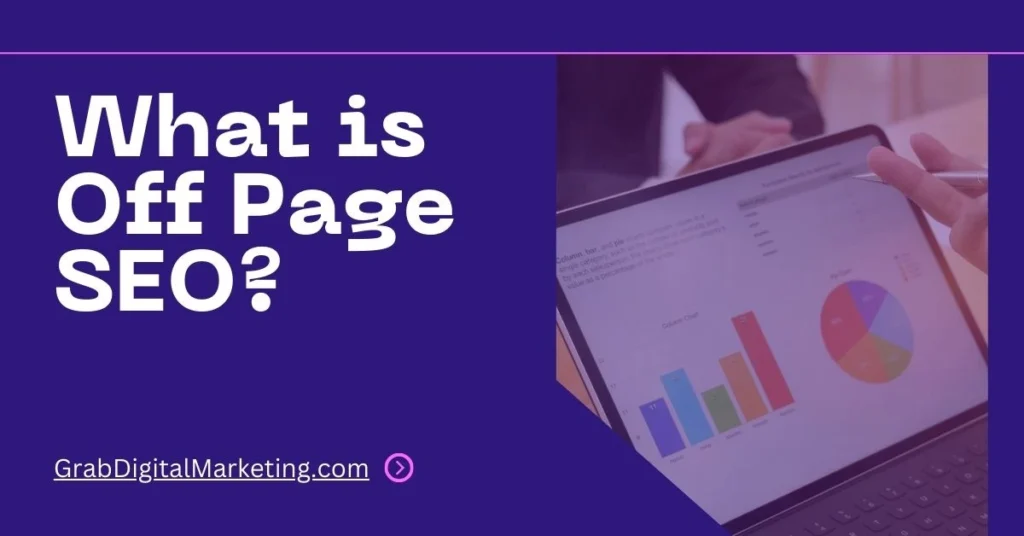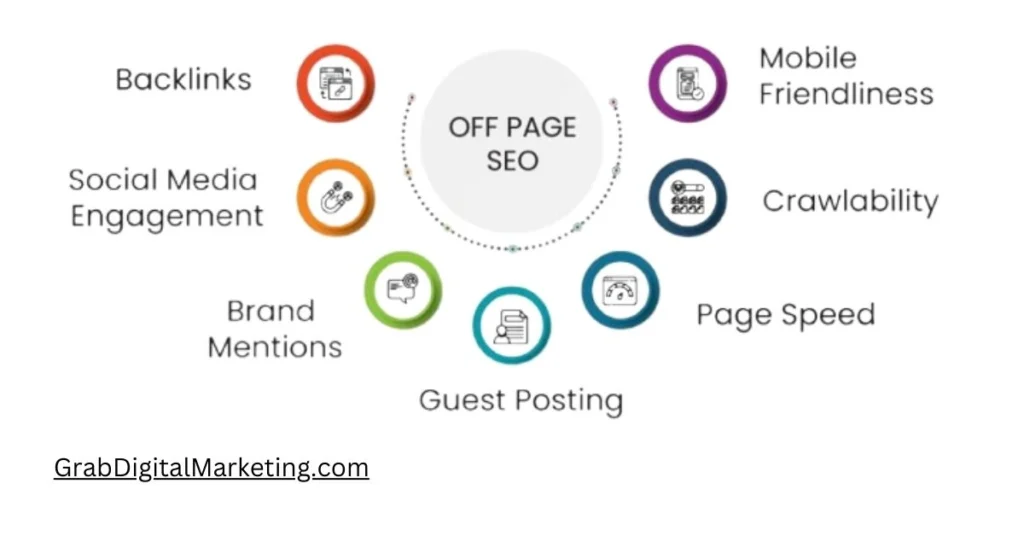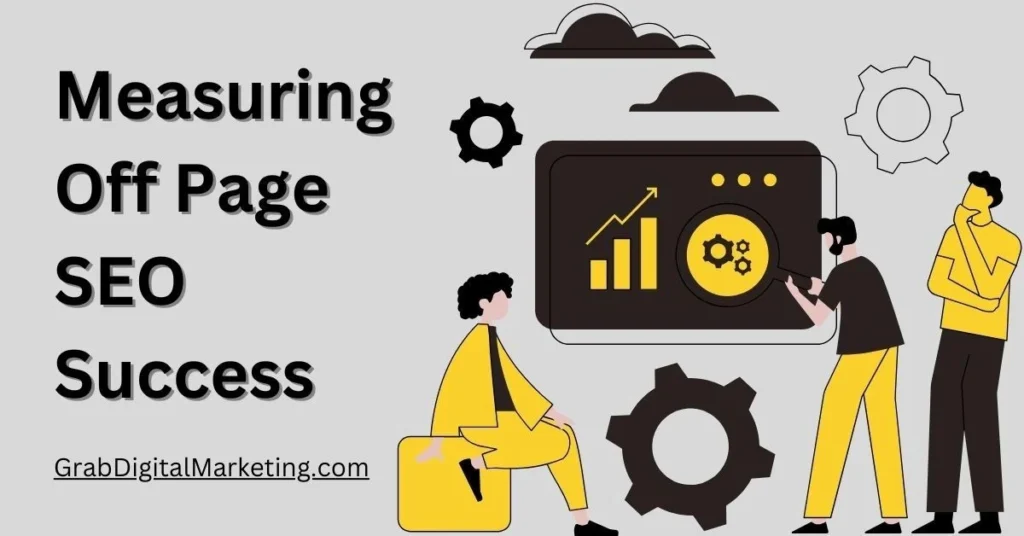What is Off Page SEO?
Off-page SEO (Search Engine Optimization) is an essential component of the overall SEO strategy. It involves a set of practices that are carried out outside the boundaries of your website to improve its search engine rankings. Unlike On-Page SEO, which focuses on optimizing the content and structure within your website, Off-Page SEO emphasizes activities beyond your site. It aims to build your site’s authority, reputation, and credibility in the eyes of search engines like Google. Here’s a comprehensive guide to Off Page SEO:
1. What is Off Page SEO?

Off-page SEO refers to activities performed outside a website to improve its authority, relevance, and search engine rankings. Unlike on-page SEO, which focuses on optimizing individual web pages, off-page SEO enhances credibility through external signals. Key strategies include link building—acquiring high-quality backlinks from reputable websites—to boost trust and domain authority. Social media engagement, influencer marketing, and content sharing also play a role in increasing brand visibility. Mentions in news articles, guest blogging, and directory listings further enhance credibility. Search engines consider off-page factors to determine a site’s authority and trustworthiness. Google evaluates backlink quality, relevance, and diversity, making ethical link-building essential. Local citations, customer reviews, and brand mentions reinforce a business’s digital presence. Effective off-page SEO builds a strong online reputation, improves search rankings, and drives organic traffic.
2. Importance of Off Page SEO

- Off-page SEO is a critical component of an overall SEO strategy that focuses on activities outside of a website to improve its authority, credibility, and trustworthiness in the eyes of search engines like Google. For Google AdSense publishers, off-page SEO is particularly important because it significantly influences search engine rankings, which drives more organic traffic to monetized pages, directly impacting ad impressions and revenue. While on-page SEO optimizes the content and structure of a website, off-page SEO builds external signals through backlinks from reputable websites, social media engagement, brand mentions, and digital PR, helping establish the site as a trusted authority within its niche or industry.
- One of the foremost benefits of off-page SEO is its ability to boost search engine rankings. High-quality backlinks act as endorsements, signaling to Google that the content is valuable, reliable, and relevant. This increases the likelihood that the site will rank higher for competitive keywords, attracting more qualified visitors who are likely to interact with Google AdSense ads. Additionally, off-page SEO enhances brand recognition and helps build a strong online presence, which can lead to more direct traffic, repeat visits, and word-of-mouth referrals—factors that contribute to sustained AdSense income.
3. Key Components of Off Page SEO

- Key components of off-page SEO are essential for Google AdSense publishers aiming to boost their website’s authority, credibility, and search engine rankings—all of which directly influence ad revenue through increased organic traffic and user engagement. The foremost component is link building, which involves acquiring high-quality backlinks from authoritative and relevant websites. These backlinks serve as endorsements, signaling to search engines that the content is trustworthy and valuable, thereby improving the site’s rankings and attracting more visitors who are likely to interact with AdSense ads. Equally important is content marketing that incentivizes others to share and link to quality content naturally, fostering a network of organic backlinks.
- Digital PR is another vital aspect, encompassing strategies like influencer collaborations, guest blogging, and press releases, which help build brand recognition and generate quality backlinks from respected sources. Social media engagement also plays a critical role by amplifying content reach, increasing brand mentions, and creating opportunities for referral traffic — all of which contribute indirectly to SEO performance and AdSense monetization. Local SEO strategies, including accurate citations and Google My Business optimization, enhance visibility in regional and local searches, driving highly targeted traffic that can improve monetization outcomes.
- Brand building beyond simply acquiring links is a broader component of off-page SEO that involves cultivating a strong, trustworthy online reputation through consistent, positive user interactions and maintaining a presence on forums, review sites, and social platforms. This helps search engines associate the brand with authority and relevance, enhancing rankings and user trust. Proper use of social signals — likes, shares, comments — is also favored by search engines as indicators of content quality and user engagement.
4. Measuring Off Page SEO Success

- Measuring off-page SEO success is crucial for Google AdSense publishers to understand how external efforts impact their website’s visibility, authority, and ultimately, revenue generation. Off-page SEO primarily involves building backlinks, improving social signals, and enhancing brand awareness, all of which contribute to better search engine rankings and increased traffic—key drivers of higher AdSense impressions and clicks. To effectively assess off-page SEO performance, publishers must track a variety of metrics that collectively reveal both the quantity and quality of external engagements.
- One of the primary indicators of off-page SEO success is backlink profile health. Tools like Ahrefs, Moz, and SEMrush enable publishers to monitor the number of backlinks, the diversity of linking domains, and, more importantly, the authority and relevance of these domains. High-quality backlinks from authoritative sites greatly enhance domain authority, boosting search rankings and attracting qualified organic traffic that is more likely to interact with Google AdSense ads. Tracking new and lost backlinks over time helps publishers gauge the effectiveness of their link-building campaigns and identify potential issues like spammy or toxic links that could harm rankings.
- Social media metrics also provide valuable insights into off-page SEO success. Increased sharing, likes, comments, and follower growth indicate strong brand recognition and engagement, which contribute to higher referral traffic. Although social signals are not a direct ranking factor, they help amplify content reach and create more opportunities for backlink acquisition and organic mentions, indirectly supporting SEO and AdSense performance. Monitoring social traffic sources via Google Analytics offers publishers clear data on how social engagement influences overall site visits and behavior.
5. Conclusion
Off Page SEO is a vital component of your overall SEO strategy. It helps build your website’s authority, acceptance, and relevance, leading to higher search engine rankings. By focusing on link building, social media engagement, influencer outreach, and brand mentions, you can significantly improve your Page SEO efforts. Remember, the key to successful off-page SEO is consistency and providing value to your audience.
By implementing these strategies and tracking your progress, you’ll be well on your way to achieving better search engine rankings and driving more organic traffic to your website.
How about that? If you need more specifics or want to explore certain aspects further, feel free to ask!

